 Happy Pride Weekend to everyone! Here in San Francisco, I’m hunkered down in the office prepping for field work in Mexico, but through my open window I can hear the cheers of the crowd from the SF Pride Parade just a couple of blocks away. This post has spent a long time languishing in my drafts folder. In fact according to the autosave records, I started this on October 2, 2010. At the time, a then recent confluence of events compelled me to dig-up a post from my old blog that explored the apparent dearth of lesbian, gay, bisexual, and transgendered people in the ocean sciences.
Happy Pride Weekend to everyone! Here in San Francisco, I’m hunkered down in the office prepping for field work in Mexico, but through my open window I can hear the cheers of the crowd from the SF Pride Parade just a couple of blocks away. This post has spent a long time languishing in my drafts folder. In fact according to the autosave records, I started this on October 2, 2010. At the time, a then recent confluence of events compelled me to dig-up a post from my old blog that explored the apparent dearth of lesbian, gay, bisexual, and transgendered people in the ocean sciences.
Those compelling events were that on September 9, 2010, Billy Lucas, a 15-year-old freshman at Greensburg High School in Indiana, hung himself after enduring bullying torment from his peers — just a few weeks into the school year. His mother found her son, hanging, in their barn. At least one former student says he made administrators aware of his own LGBT bullying, and they did nothing.
Then, Seth Walsh, a 13-year-old California teen, was found September 19, 2010, unconscious and not breathing, and it appeared he had tried to hang himself from a tree branch. He spent 10 days on life support after attempting suicide over relentless bullying because he was gay.
Later that same month, Tyler Clementi, an 18-year-old Rutgers University freshman, discovered his college roommate had spied on him from another room with a webcam and streamed a live Internet feed of Clementi’s encounter with another man in their dormitory room. On September 22, 2010, Clementi walked onto the George Washington Bridge and jumped over the edge to his death.
On Thursday, September 23rd, 2010, Asher Brown, a 13-year-old who had recently told his parents he was gay, came home from school in Texas and shot himself in the head. Brown’s parents say he was “bullied to death,” picked on for his small size, his religion, and was accused of being gay.
And on September 29, 2010, a 19-year old, openly gay college student named Raymond Chase committed suicide. Chase, a student of culinary arts at Johnson & Wales University in Providence, Rhode Island, hung himself for reasons that remain unclear.
Different geographies. Different people. Different circumstances. Yet identical outcomes.
Prompted by Billy Lucas’ suicide, columnist Dan Savage launched the It Gets Better video project. In Dan’s words,
“I wish I could have talked to this kid for five minutes. I wish I could have told Billy that it gets better. I wish I could have told him that, however bad things were, however isolated and alone he was, it gets better.”
“But gay adults aren’t allowed to talk to these kids. Schools and churches don’t bring us in to talk to teenagers who are being bullied. Many of these kids have homophobic parents who believe that they can prevent their gay children from growing up to be gay—or from ever coming out—by depriving them of information, resources, and positive role models.”
“Why are we waiting for permission to talk to these kids? We have the ability to talk directly to them right now. We don’t have to wait for permission to let them know that it gets better. We can reach these kids.”
I won’t explore the success or failure of the It Gets Better campaign here. But back in the Pre-Cambrian, as a young, struggling, proto-marine biologist, queer high school student, I had my own experiences with harassment and hostility. I may not have been out then, but I also was not part of the “herd.” And when you separate from the herd, you make yourself an easier target. I never benefited from the voices or stories of adult LGBT folks who were living their dreams in science careers. I can only speculate what an emotional, academic, and professional boost it might have been to have simply heard, “Hang in there. You’re not alone. It gets better!”
And it did, eventually, get better. Immensely better. Extraordinarily, monumentally better.
Still, my LGBT exemplars in ocean science were too few… too far between.
Kevin Zelnio’s fantastic piece last year on the dearth of black professors in marine science also served as catalyst for me to re-explore my original post on the dearth of LGBT professors in marine science. Kevin also encouraged me to try to gather some statistical data that might demonstrate how populous LGBT folk are in our chosen scientific discipline.
And so, a survey was born.
Last October, I began collecting responses to a series of related questions on experiences, perceptions, and attitudes of self-identifying LGBT folk who studied–and are now working in–science, technology, engineering, and math (STEM) areas affiliated with the ocean. Thanks to folks with formidable online social networks like Bora Zivkovic, Liz Neeley, and others, I got significant amplification on the survey announcement. Miriam Goldstein blasted the survey to the Scripps Institution of Oceanography list serve, and colleagues at Woods Hole did the same. I also got the survey to circulate through the National Marine Educators Association membership as well as the National Organization of Gay and Lesbian Scientists and Technical Professionals (NOGLSTP) membership.
Still, responses to the survey did not come flooding in. By Feb 1, I had collected only 44 respondents. I knew the small sample size couldn’t tell me anything that was statistically significant. But I also questioned whether the results helped answer any of my original questions as to whether negative LGBT experiences as a student or professional in ocean science helped explain the apparent dearth of out/visible LGBT folks in the discipline. I’m still not sure I’ve gotten greater resolution.
My initial take on the results is that instances of harrassment or intimidation directed at individuals perceived as being LGBT were not a common thread either in answers to questions or through elaboration in comments. The overwhelming majority of respondents identified as being out both during their undergraduate/graduate academic preparation as well as in their current professional careers (which in itself seems a positive sign). Being good scientists, quite a few respondents availed themselves of the “Not enough data to compare” option in answering some questions. Still, respondents seem to perceive ocean STEM areas as about the same in (and perhaps slightly more) accepting of LGBT people. Respondents also indicated that having out and visible LGBT exemplars in ocean science during their academic careers would have been important and presumably helpful.
Since the survey was designed to be brief and relatively painless, I did not provide an opportunity to cross reference questions for deeper analysis. If I were to conduct a follow-up, I’d want respondents to unpack their answers a bit more to understand what instances of acceptance or harassment looks like in order to get a clear picture of the social climate respondents are describing. And I think you will find the optional comments provided a more personal (and at times emotional) counterpoint to the multiple choice Likert-type questions.
Regardless of the delay, there’s a certain satisfaction in summarizing my findings on Pride weekend as a celebration of diversity. While the majority of survey respondents describe a reality for LGBT people in ocean sciences that appears relatively benign, at the same time I don’t get the sense that it’s particularly encouraging for LGBT folks either. Kevin made a prescient observation last year in his piece on black professors in ocean sciences that as biologists, we’re trained to appreciate and preserve biodiversity. Here’s hoping that some of these findings help us to accept and celebrate that we are all part of that biodiversity as well.
[Click on images below to embiggen and improve resolution]

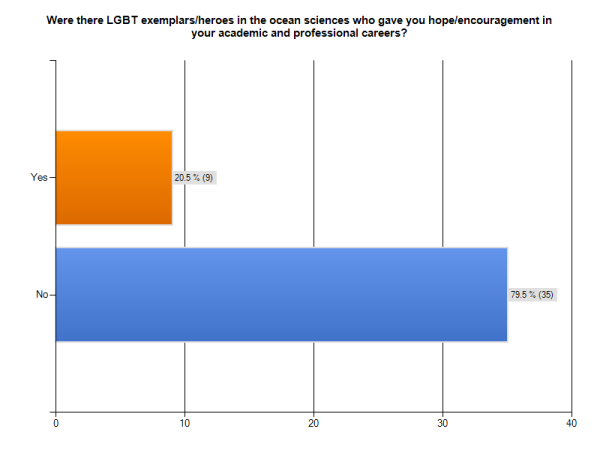
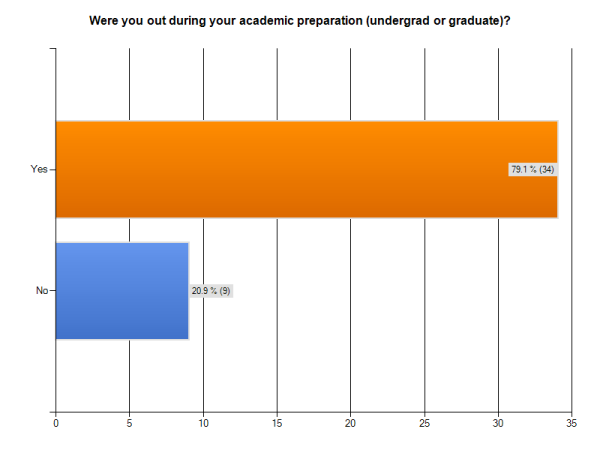
Optional Comments:
I think it is not necessary to show everyone our personal interests in a work environment. The two environments can (and should) be separated one from the other.
Came out my senior year of college and thus have been out for my entire graduate program (I’m in my 5th year of a PhD program).
I did not come out to myself until about age 40.
Not out as an undergrad, but out in grad school.
I identify as bisexual and during college I was openly dating a woman. As a graduate student, I have only revealed my sexuality to close colleagues, thus I am not really “out” to the community at large.
Not out in undergraduate. Out in graduate, although not hugely vocal about it.
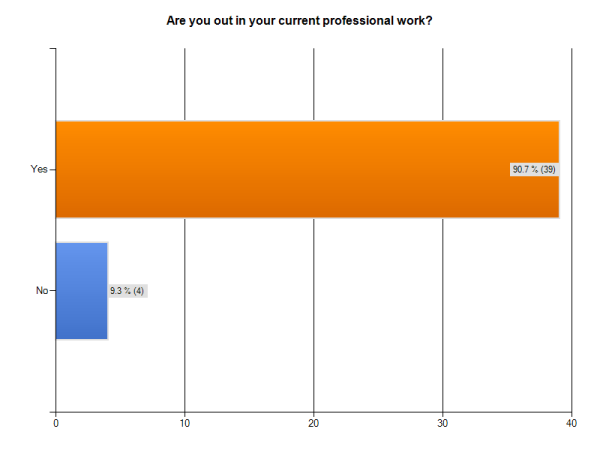
Optional Comments:
I’ve never told my adviser or co-workers, but I don’t hide it.
I do work on the side as a consultant on an ocean protection program with individuals from a number of agencies and I’m out with them (or at least the ones with whom I talk about social things).
I teach at an amazing (public) high school. Jokingly referred to as an LGBT magnet program in a city that is already fairly friendly. There is an anti-discrimination based on sexual orientation and gender identity in the district I work in.
Most of us do not discuss our personal lives with our teen interns, though I think my sexual orientation is an open secret among the teens.
If someone asks.
I do not deny that I date women, but I do not flaunt it and I usually do not tell anyone unless they specifically ask or if I feel comfortable telling them. But that goes for all people, not just the people I work with.
I would like to note that I was not out when applying for the position. Only when I got the job did I come out.
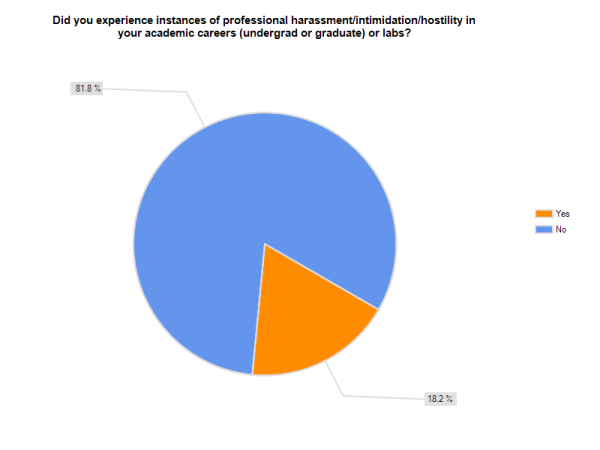
Optional Comments:
Jerks are everywhere, but there have been proportionally far fewer instances of homophobia in scientific settings than in other job settings and social situations.
If ever a casual conversation comes up about girls or sex I’m hesitant at best to participate, especially if someone is present whom I don’t know their acceptance of LGBT.
Rare, but present. Called a Bitch by a co-worker. Overhearing spectacularly homophobic & sexist conversations.
My work place has been very accepting and supportive.
By other conservative undergrads, not specifically in the sciences.
I have experienced hostility in my graduate career, but not related to my orientation.
I have encountered occasional instances of people speaking ill of gays in general at the graduate level even in enlightened California and leering and other inappropriate behaviors from some of my colleagues who inadvertently discovered that I am bisexual.
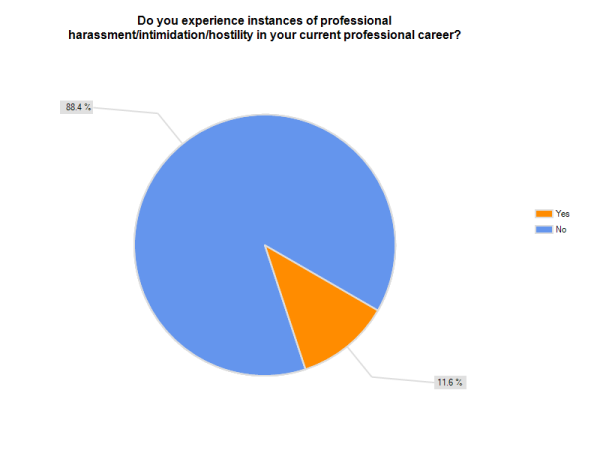
Optional Comments:
I am now semi-retired, but previously found myself bumping some glass ceilings in Alaska thanks to Sarah Palin-style buttheadedness there.
Not outright but there’s always a filling of intimidation/hostility, especially when I don’t know someone’s acceptance.
Though I still get that rush of adrenaline every time I casually mention my husband to someone new–DFG has some “man’s club for men” kind of types in it.
I work with high school kids- it’s rare, and my coworkers and administration are very amazing in their response. But, several students have been overtly hostile in their comments.
In my first high school teaching assignment (for 2 years) I was out to colleagues but not to students. There was a great deal of anti-gay sentiment in that student population and I did not feel safe to be open in that environment (both in terms of getting respect from students and of having the support of administrators). My current school is very supportive. While I don’t discuss my personal life in any detail with most students, I am also open when asked direct questions by students and I think it is generally known that I have a partner.
There are several people who make homophobic comments on a regular basis. Although no directed at me personally, I often feel uncomfortable and offended.
I have not experienced any outward hostility, but I would say the effects are more subtle. Like not coming out because you fear being passed over for a position or given a good recommendation.
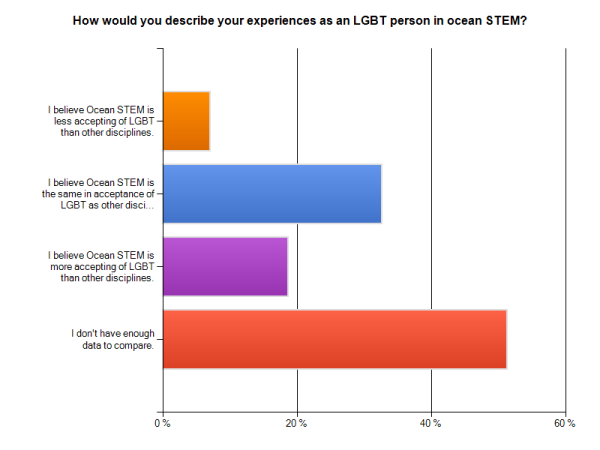
Optional Comments:
Maybe even a bit more accepting. Far from all Ocean STEM folks are routinely 90% naked while splashing around on wet decks and snorkeling in lagoons, but those I have been around who are seem much more robust and less inhibited in general than are people who spend their whole worklife in a cubicle. Plus, travel is the best possible education and many Ocean STEM scientists travel a great deal, broadening their perspectives.
It’s completely in the closet. Unless someone has volunteered their opinion, which is rare, it’s never discussed, and even then barely in passing. It’s not something I want to bring up because in the general population I’ve known people that are the nicest most caring people you would ever meet and then when they find out you’re LGBT they treat you like you’re Satan. That’s not the way you want someone who could potentially hold the future of your career to look at you.
Most of my colleagues are quite liberal.
As a queer woman it is hard to differentiate between homophobia and sexism. But they often go hand in hand.
My comparison is to my partner’s experience in Math (way friendlier) and friends who went into Ecology rather than Oceanography. Math- there is a gathering of LGBT individuals at the major conference; there is a separate research association for women that is highly respected; there are panels and discussions on diversity and how to make it in the profession at major conferences; there are clear networking lunches with assigned mentors for women in math.
I am accepted as a colleague as everyone knows and I am well respected and useful.
We’re nerds, so I think we tend to be fairly accepting of variance.
The only thing that seems to matter in this institution is the quality (and quantity!) of one’s work.
I have been well-received at National Marine Educators Association events when discussing my partner and have experienced no discrimination there. My primary educational training and professional experience is not in ocean-focused areas.
It seems that the community at large doesn’t see any big deal about identifying with a certain sexual orientation. They certainly don’t outwardly express hatred, while they don’t celebrate it either. They almost seem disinterested as though it is a very normal and perhaps uninteresting part of life. So I suppose that classifies them as rather accepting. Again however, I don’t have enough data to say definitively.
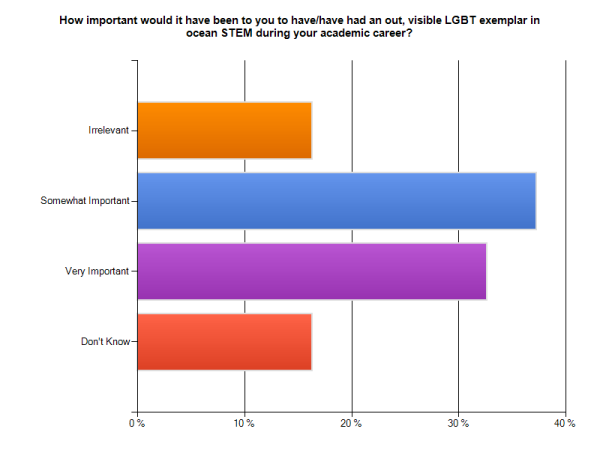
Optional Comments:
It was invaluable to have the encouragement and guidance of Dr. Karl Mauzey (his original work was as a marine biologist before he became a professor of human sexuality and computer science) during my college years.
In some ways it’s irrelevant because it doesn’t have an impact on my work, but it also prevents me from being myself at work/school which can influence my professional career especially when it comes to networking. On the other hand it’s also important to have out role models so that people can see it’s not a big deal and that LGBT can contribute as equally as non-LGBT, just as it’s important to have women and minorities in the field to encourage the future generations.
I guess the technically correct answer would be “Irrelevant,” because I’ve made it this far without one and I’m doing just fine. But I frequently wish I didn’t feel like I’m the only freakin gay marine biologist in the world and I do sometimes worry about how future employers will react.
“Friendly” would also help.
It is always encouraging to see others like you doing the things you want to do.
Didn’t matter as I was a student in CA and life was easy.
I think it is very important to have professional role models for all students to identify with – you don’t see many LGBT visible role models.
I am who I am, and do not base my sexual orientation on positive role models in leadership/academic positions.
Question: Any notable, out LGBT ocean STEM heroes you can name? n = 15
NOGLSTP Educator of the Year, Karl Mauzey
No
Never heard of a single one.
No
No
I wouldn’t really refer to her as a hero, but Gretchen Hoffman is probably the most visible LGBT person in ocean STEM.
Nope
No
Me. I have been around for LOTS of graduate students at WHOI over the decades.
Can’t think of any.
Maybe one
Gretchen Hofmann, Mary Sewell (both biologists)
Nope
No, and this made me laugh.
Joan Roughgarten




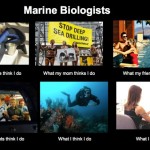

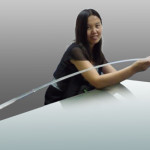
Wow, thank you very much for this post! As a graduate student, this is wonderful to read and hope that we continue to move forward as a society.
This was just posted at Inside Higher Ed: Do gay and lesbian professors face discrimination from students? A new study — just published in The Journal of Applied Social Psychology — suggests that they do, with regard to perceptions of political bias.
The article sort of ties in some of the content of this post.
Great job on this Rick! I know it was tough with low turnout, but there is a lot of value of having this out there in the public for all to see. Hopefully it can help influence things.
I think it’s easier in botany. We don’t attract very many of the aggressively macho guys (except sometimes in forestry and range), and many of us are so truly odd that merely being gay can seem trivial.
Role models do help, of course. Some of the Big Names in botany were gay men. Several (most?) of the women one hears about were/are tough and independent people, great role models whether they were/are straight or lesbian. In the department where I got my Master’s, of three botanists, one was gay and one lesbian. Nonetheless, I didn’t come out until my forties (being better at botany than at self awareness).
I’m quiet about sexual orientation when applying for a job but out afterward. (I have a happily out partner – how closeted can I be?) If class discussion leads me to discuss gays and lesbians, I use “we,” sometimes to my students’ shock. (Sometimes, though, only the gay or lesbian students notice!)
The only down side I see of being open about my sexual orientation in class is that students so inclined can bundle “concern for the environment” and “belief in evolution” with “homosexual” into a package they find easy to reject in its entirety.
I just came across this post, and am sorry I didn’t see the survey earlier. I started the LGBT group (“GLOW”) at WHOI back as a graduate student in 2008. I’m not sure if it’s still operational, but back then I saw a serious need to have a visible place for us to have representation and a voice in the community. I had some interesting reactions from various administration folks – they were supportive of the idea in general, but skittish about the particulars. The feeling I got was they were fine with our existence as long as we weren’t too “loud” about it. We went ahead and established the group anyway, and feathers were minimally ruffled. I really hope LBGT ocean scientists continue to push for having a seat at the table. There are plenty of us around, but our visibility is low. I’m currently at a university that will not offer domestic partnership benefits to faculty or staff, so there is clearly a need to keep identifying ourselves as an integral part of the academic community.
Thanks so much for doing the survey, and keep pushing for that visibility!
Ben Walther